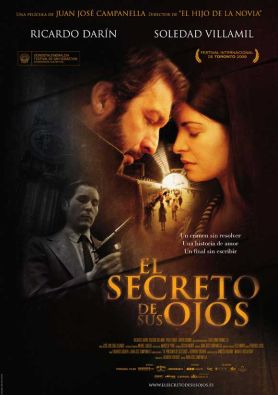Secret in Their Eyes, The (El Secreto de sus Ojos
Here’s a question for you. Someone with a glittering eye, like Coleridge’s Ancient Mariner, buttonholes you on your way to a wedding. Like the Ancient Mariner too, he has a fascinating story to tell, and he prefaces it by saying this: “A guy can change anything. His face, his home, his family, his girlfriend, his religion, his God. But there’s one thing he can’t change. He can’t change his passion.” Do you believe him? In one way, he himself seems so passionate that you think he ought to know, and the thing does sound sort of profound. Yes, it certainly ought to be true — and, if you stipulate that it is, you get to hear his story whose fascination depends on just this assumption about passion. In fact, without it the story would hardly even make sense. It seems a small price to pay for the satisfaction the story gives you.
Once you manage to tear yourself away from the Mariner and have a moment to reflect, however, you can’t help thinking that that central proposition, this assumption on which all else depends, is nonsense. Passion dies and changes like everything else. Some people don’t have it at all, and for some it is only the thing of a moment, a sudden summer storm that blows up and immediately dissipates. Even those rare souls for whom a particular passion amounts to a lifelong obsession for the most part live their lives pretty much like the rest of us. Unless they associate exclusively with those who share their passion, they have to disguise it in order to avoid being a bore to those around them. At any rate, it must be easier than disguising one’s face.
El secreto de sus ojos
, now released here as The Secret in Their Eyes, by Juan José Campanella (Son of the Bride) is just like that Ancient Mariner, and one of its characters, Pablo Sandoval (Guillermo Francella) says what he says — the thing about unchanging passion. And, lo, while you are listening to him, you may find it easy to believe. I know I did. But if you are more of a rationalist or a harsher judge than I, I can well imagine that you might find yourself saying, when you see it: What tosh! But if, like me, you don’t say it until after the lights go up and you’re back out on the street, then I think you might just like this movie as much as I did, and as much as did the Motion Picture Academy, always better judges of foreign than domestic pictures, when it awarded it this year’s Academy Award as Best Foreign Language Film. But then I like a bit of passion, and Se or Campanella, an Argentinian, certainly has a lot of it. Secret is a sort of cinematic equivalent of an Argentinian tango, itself full of semi-stylized passion as well as a representation of it.
Set in the present and, in flashback, in the mid-1970s at a time of a gathering storm of political violence in Argentina that was to break soon afterwards, the movie is both a whodunnit — though without, except incidentally, the expected political dimension — and a love story. After the rape and murder of a beautiful young wife (Carla Quevedo), the investigating officer, Benjamín Esposito (Ricardo Darín), finds that he is both unable to solve the case and unable to forget it. Years later, when he retires, he tries to write the story as a novel, but he keeps changing details and inserting into the story himself and his long-held but secret passion for his beautiful boss in the public prosecutor’s office, Irene Menéndez Hastings (Soledad Villamil), who is recognized by everyone as a woman out of his league. When he returns to the office to refresh his memory about the case, he also re-establishes contact with her, and the two of them find that the solution to the mystery poses more than one sort of danger to their lives.
The themes of the picture are thus time and memory and story-telling as well as passion, which is something quite different for each of the main characters. Yet each shares an equal horror of what the film poses as passion’s opposite, “a life full of nothing.” Morales (Pablo Rago), the husband of the murdered woman, sees his life without her in this way and believes that the only proper revenge on her killer would be to see to it that his life was full of nothing. “It’s as if his wife’s death just left him there, stuck in time, forever,” says Esposito pityingly, even as he is fascinated by the man’s undying devotion — his passion for the dead woman. “You should put it behind you, take it from me,” Morales advises Esposito on his new quest for the killer. “It’s my life.”
But Esposito contradicts him. “No, it’s my life too. Your love for the woman — I never saw it again.” Morales’s agonizing memories are inspirational to Esposito, even though this seems to both men a basic discourtesy, a kind of social faux pas.
Yet all is not as it seems, and memory, though we are its prisoners, is not the nothing these lives are full of. Irene, now a judge, tells Esposito about his novel, “You have come to the end of your life and want to look backwards. My whole life has been lived forward. I can’t look back; backwards is out of my jurisdiction. I declare myself incompetent.” Her wish to think of her past self as somebody else — “I was another person; it was another world” — is just one of the ways in which the film’s characters try to escape from their past and “leave it behind” them. In the end, “memories are all we end up with,” says the permanently bereaved Morales to Esposito. “At least choose the good ones.” But memory is all bound up with passion, and escape is no more possible for him than it is for anyone else.
It would be hard for me to imagine many films, foreign or domestic, better calculated to appeal to those of a romantic nature. One word of warning, however. Early on in the film there is a horrific image of the raped and murdered woman which even today’s jaded movie-goers may find shocking. That shock is, it might be argued, integral to everything which follows, but I am not so inclined to let that be an excuse for it as others might be. There’s quite enough baring of emotional secrets in the film without its having to turn to physical ones for reinforcements.
Discover more from James Bowman
Subscribe to get the latest posts to your email.







